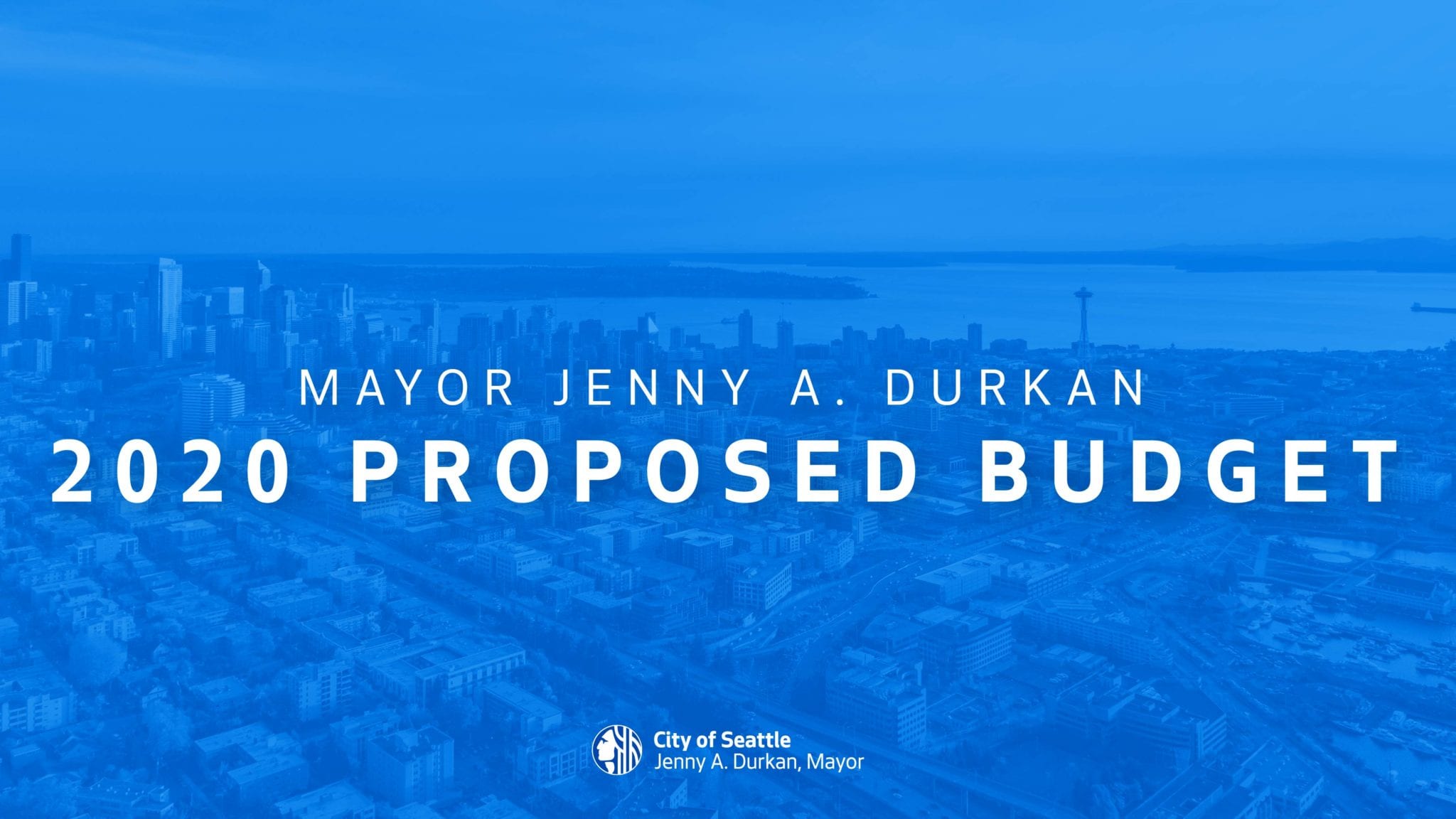

Mayor Jenny Durkan’s 2020 Proposed Budget invests in our shared vision for a better future. Her budget makes responsible investments in five key priorities: Youth opportunity; public safety; homelessness; housing; and transit and transportation. The 2020 Proposed Budget is balanced, totaling approximately $6.5 billion.
WATCH THE SPEECH
FACT SHEET
Download the 2020 Proposed Budget Fact Sheet
Explore Mayor Durkan’s 2020 Proposed Budget
- Mayor Durkan Announces $25 Million to Advance New Affordable Housing Across Seattle Using Existing Revenues
- Mayor Durkan Announces $31 Million in New City Investments in “Vision Zero” Transportation Safety Projects and Transit Improvements
- Mayor Durkan Announces Plan to Nearly Double City of Seattle’s Child Care Assistance Program to Serve 600 Additional Children
- Explore the full budget here
2020 Proposed Budget Speech

Mayor Jenny A. Durkan’s remarks as delivered:
Alright Jaeden, that was amazing!
I got to meet him last year in the Teen Summer Musical, he’s phenomenal in everything he does.
Council President Harrell, members of the City Council, Superintendent Juneau, City Attorney Pete Holmes, community leaders, members of my Cabinet, the amazing students and staff of Franklin High School, and all my fellow Seattleites:
Good morning.
Good almost afternoon!
Thank you all for being here today.
And Council President Harrell, thank you for NOT wearing your Garfield Bulldogs gear.
Once a year, I get the chance to present my budget to the City Council and the people of this City.
And from the start of the Seattle Squeeze to the February Freeze, it has been a big year in Seattle.
And it is great to be here at Franklin High School.
Back in the day as a young lawyer, I loved coming to Franklin High School to help with the mock trial team.
This morning, I wanted to be here because my budget seizes on our chance to move ahead on the things we care about.
And things for which Franklin High School is at the epicenter in advocating for:
Free college.
Affordable housing.
Justice and equity.
Protecting workers.
And more transit, bike infrastructure, and safer streets.
Seattle is changing, and with our budget we can decide what kind of city we want to be.
Our budget reflects the present and future we want for the people of Seattle, and for our youth, like the students here today.
Look, I admit it:
I love Seattle.
From coffee shops to the grocery store to town halls to roundtables, I love meeting and talking to the people of this city.
I hear hope, but I hear anxiety, too.
Mostly, I hear shared values, shared priorities, and a shared vision of a better future for our City.
Together, Council, we know that Seattle needs a government that works – that delivers the basic City services that residents demand and deserve.
But basic services are only the floor.
We can and must do much more than that.
While the other Washington is all about division, here in Seattle, we believe in solutions.
We believe that Seattle must be an inclusive and just city that’s truly open to everyone. That says that immigrants and refugees are welcome here.
Where a childcare provider or teacher can actually afford to live in the same community as the children they care for.
And where Uber and Lyft drivers can afford to live in the same city as the people they drive.
I sat down with some drivers in the last week.
They told me how they sometimes drive 10, 12 hours per day.
Hard, exhausting work, with every kind of issue ending up in their cars.
They are working full time and then some, and they barely make ends meet.
We can do better.
They deserve at least a minimum wage and reasonable expenses.
Council, Cabinet, all of us together we must continue to dismantle systemic racism and injustice – wherever we see it.
And students of Franklin, this is your town.
We know we must give you the opportunities and the skills so you can build the city of the future.
That’s why our budget will provide free college, free transit, and pathways to amazing jobs.
And in these tough times, we also must also tap into our common humanity, and remember we are all in this together.
We must do more to help our neighbors experiencing homelessness.
We must do more to lift each other up.
We must build more housing, especially housing near transit, so that the nurse assistants, restaurant workers, and the teachers right in this building can live in the city they make great.
And speaking of teachers, and staff at Franklin: Can we give them a round of applause…
On Friday, students led the city in a Strike for Climate.
How many students here participated? Alright…
And with this budget, we will act urgently on climate.
We must ensure the future of our planet.
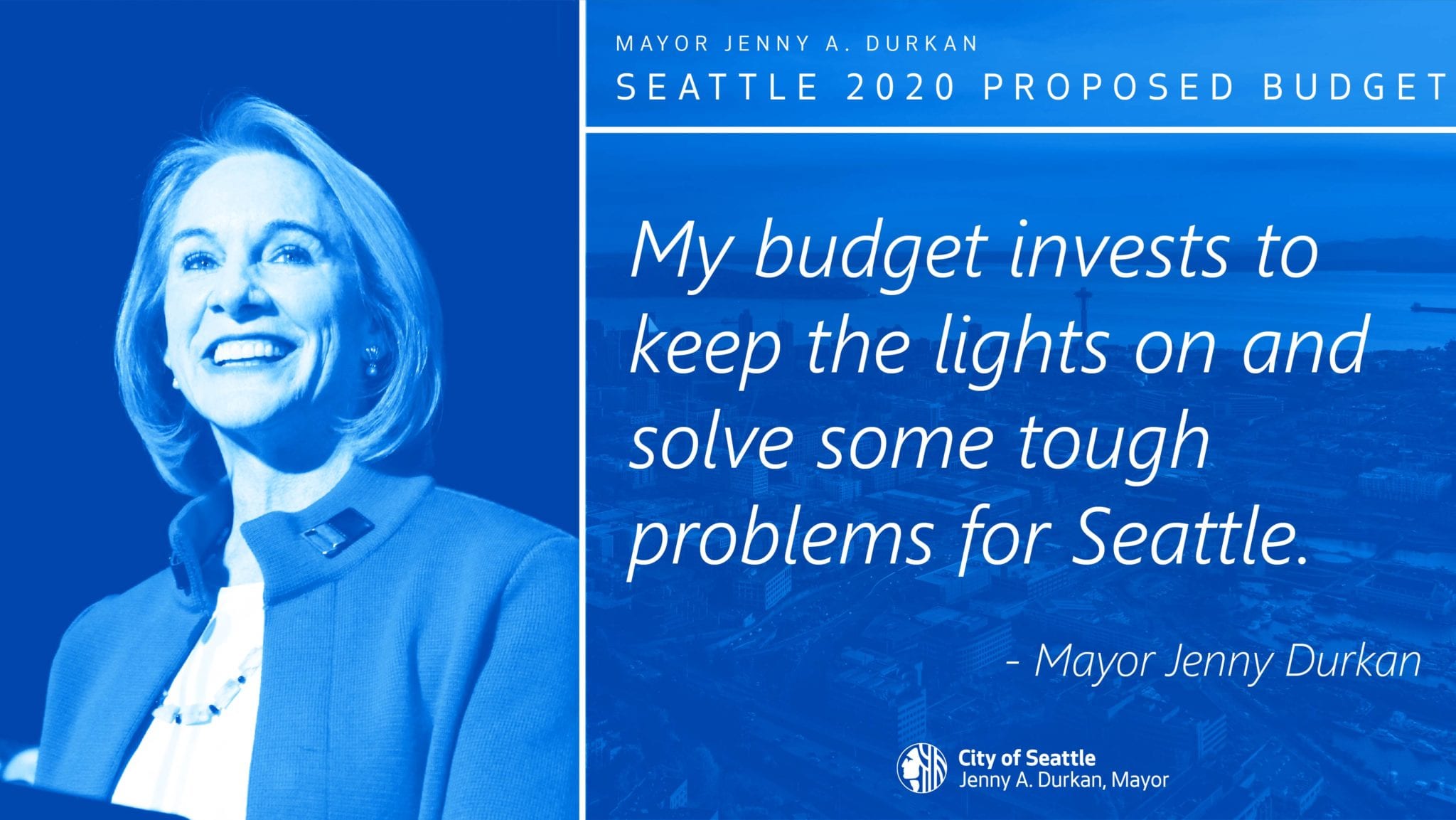
This budget keeps the lights on and invests in progress on some tough problems for Seattle.
Basic City services includes:
Picking up the garbage.
Delivering clean electricity.
Plowing the snow.
Filling the potholes.
Keeping people and goods moving during the Squeeze.
Tackling tougher problems is harder:
But it means delivering on the promise of opportunity, including two years free college for every student here, if you want it.
But that’s only the start, then it means helping you get the greats jobs and careers deserve.
It means requiring a minimum wage and expenses for Uber and Lyft drivers.
It means building more affordable housing in every part of the city.
And with this budget we will usher in a new era in the fight against homelessness.
And we will continue our other big fights for climate, for justice, for making sure our City stays a welcoming vibrant city where folks can actually afford to live.
This is a budget about our future.
And I mean our future.
Students, the first priority of my budget is all about building opportunity for you and the young people in Seattle.
Together, we must build a city where your zip code, your race, your place of birth, all the things that make you who you are do not decide your destiny.
If we do our job right, students, you get to decide your destiny.
Too few of our high schoolers graduate ready to participate in the economy of Seattle.
If we don’t close the opportunity gap in school, we know we cannot beat the inequities that exist in Seattle today
Are there any seniors in the house? C’mon!
Seniors, thanks for being here. And if you do your job – if you graduate – we have an option for you and every student at a Seattle public high school.
Yeah, even your rivals, Garfield and Beach.
The Seattle Promise College Tuition Program will you two years of free college at any of the three Seattle Colleges.
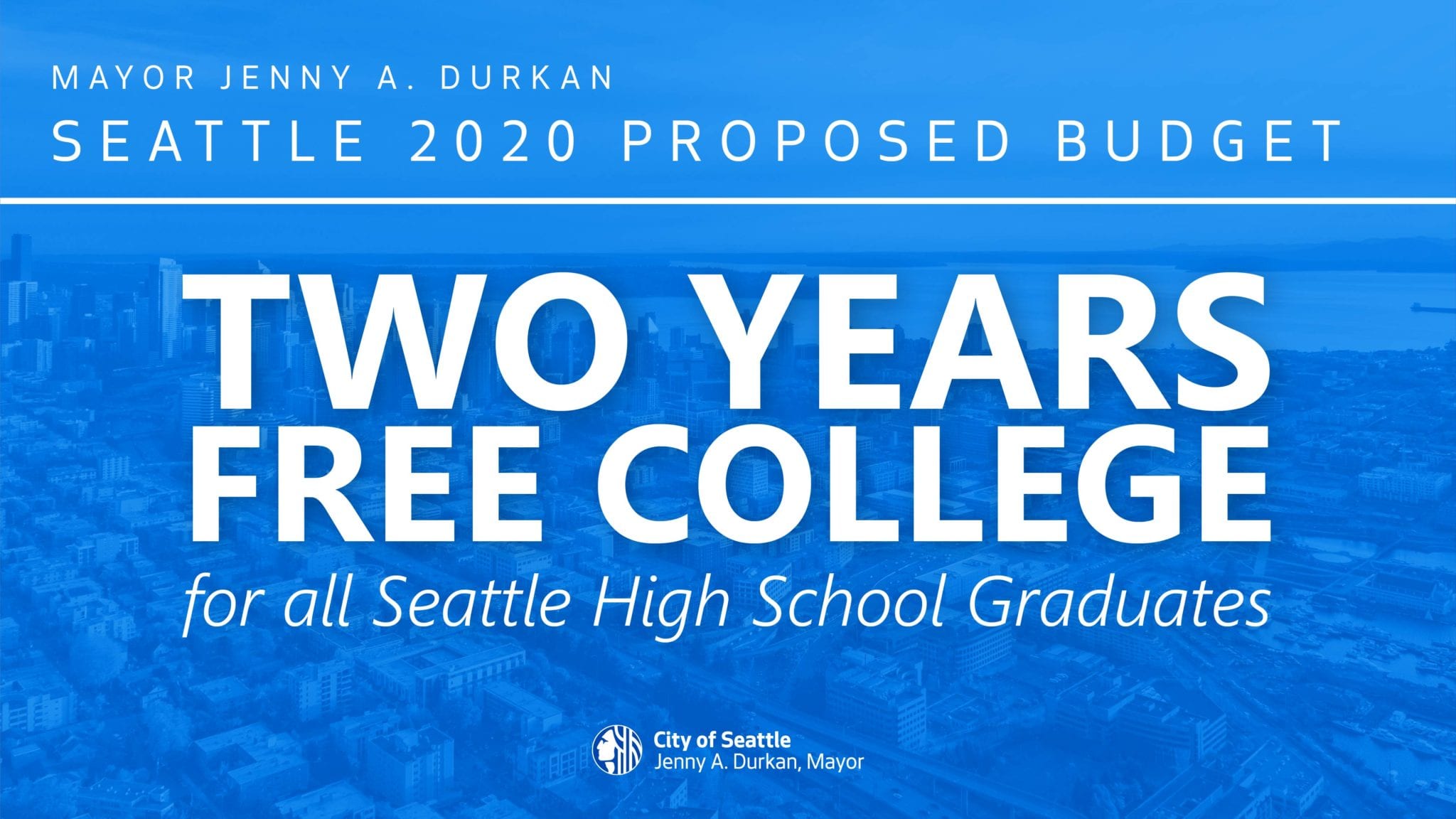
And we’ll help you with those other obstacles like books, fees, childcare and transportation.
So if you want that chance after your time here at Franklin, the City of Seattle will make sure it’s available to you.
But we know that is just a start.
We’re taking other steps:
We also created a new internship program for students doing the Seattle Promise program.
That gives those students the chance to have paid, and I mean paid, internships at some of Seattle’s most innovative companies and labor unions, gain some experience, and make progress on their career goals.
People like Kennet Vera.
He’s the first person in his family to go to college.
He’s a Seattle Promise student doing the Opportunity Promise internship at Expedia.
And this fall, he ships over to an internship at SEIU 775.
Those are the opportunities that you deserve, and all our youth deserve.
We know these programs work:
They help students move from school to training to jobs.
From the best labor apprenticeships, to tech, to any field you can imagine – we want to open doors.
To every student here, like I said: This is your city.
Whether you want to be an iron worker who builds those new buildings downtown, the biotech worker who invents the cure to cancer in those buildings, or you want to be the person who owns the buildings – we are with you.
We want you to reach for your dreams – including dreams of making it in the creative economy.
Film, the arts, music, and culture.
Our creative industries are not just good for our economy – they make our City better, and the vibrant, and soulful city that we want to be.
With that goal, we’ll also invest to in work to build Seattle’s creative industries and make it an economic priority.
Our Office of Film + Music will work in partnership with our great entertainment community. We want Jaeden to be on the stage again, showing everyone else how to do it!
But as a city, we know we cannot wait until high school to build opportunity.
We have to support families and children.
That’s why this budget makes new, unprecedented, investments in childcare.
I know what a big deal this is:
As a working mom, childcare was really important to my partner and I.
And I really want to thank Councilmember Teresa Mosqueda, Councilmember Lorena Gonzalez, and Councilmember Sally Bagshaw for their commitment to expanding access to childcare in Seattle.
Childcare is hard to find.
And it’s getting more expensive.
So our budget will nearly double our childcare program.
We’ll ensure that the parents of up to 600 MORE children will get help with the cost of childcare.
We have to start early if we want our children to have the best Seattle jobs.
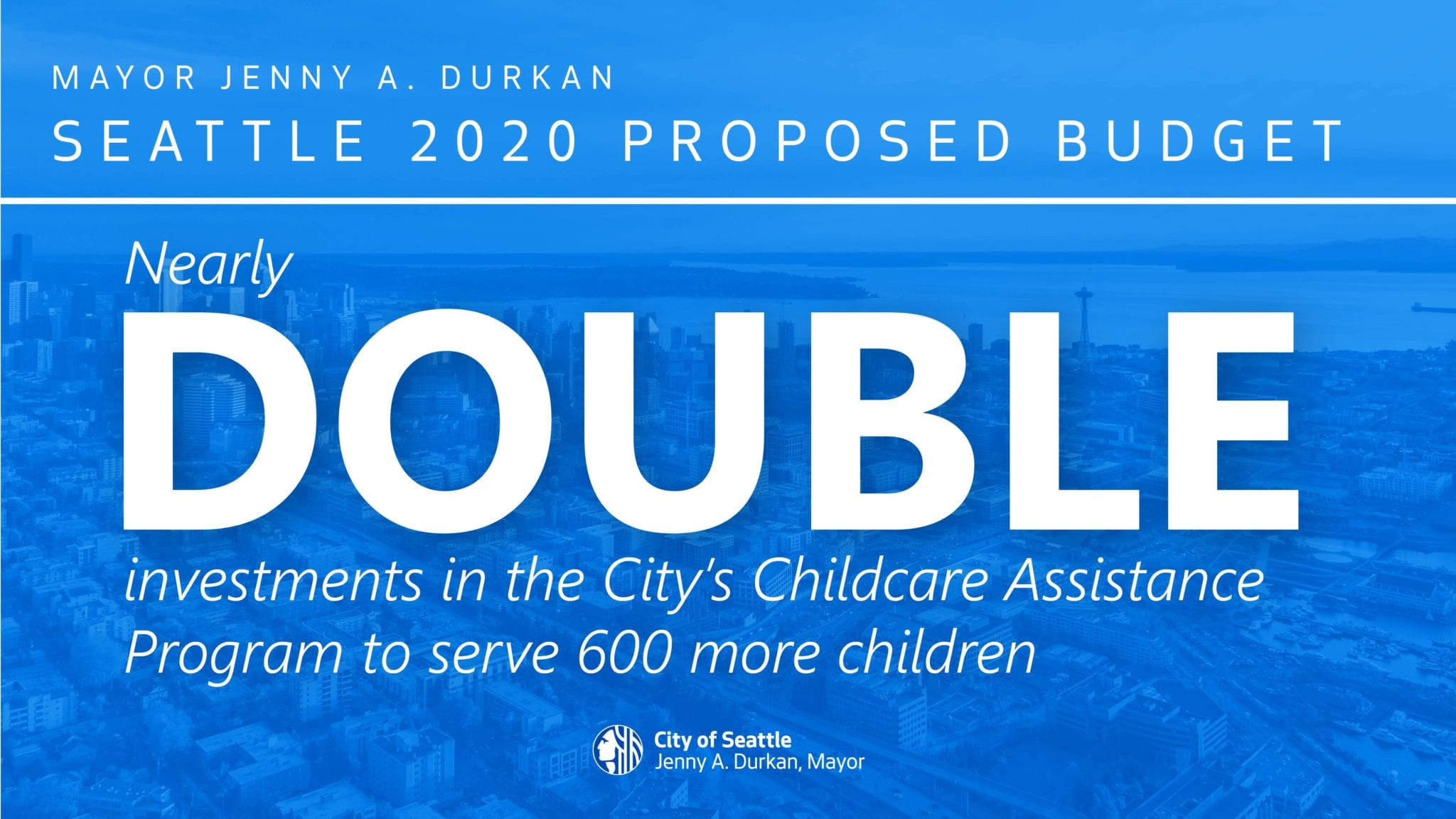
The second priority of my budget is to invest in safer, and more just communities.
Because of the leadership of Chief Carmen Best and our officers, we have become the national model for crisis intervention and de-escalation.
Crime in Seattle is down compared to this time last year.
But as the city has grown, so have the challenges of our urban environment.
That’s why my budget works to address those challenges.
It adds new
officers and expands our Community Service Officer program.
It supports community-based emphasis patrols, so there’s more officers walking
and biking in communities they serve.
It expands the Seattle Fire Department’s Health One program, a team of specially trained firefighters and a civilian specialist that helps people with 9-1-1 calls that aren’t really emergencies but where people still need help.
Like people who need help with substance abuse and accessing services.
Just like Medic One became a national model, I think Health One can too.
As we announced two weeks ago, my budget will also help fund four new pilot programs to address the complex intersection of homelessness, the criminal justice system, behavioral health, and substance abuse disorder.
Our system simply is not working:
Too many people are cycling through the criminal justice system, impacting them and their communities. They’re not getting the help they need.
We have to change that.
And that requires separate City, state, and county agencies coming together to get it done.
If we are going to be the city of the future, people must be able to thrive and be safe where they live, work, and play.
But public safety is about a lot more than police and firefighters.
True public safety means that everyone, regardless of where they live, or what their background is, can have access to lasting opportunity.
That’s why in this budget, we’re renewing our commitment to not just community-based policing, but to true shared opportunity – like free transit, college and jobs.
And also by investing in restorative justice and youth safety.
We should never give up on any youth.
This budget also invests in addressing one of the most challenging moral things of our time:
Our homelessness crisis.
Over the last year, we have made investments that are having an impact.
The City is doing more than ever to help our neighbors who need their help and are living unsheltered.
We’ve created greater accountability, and we’ve helped more people.
We’ve helped more people and ensured we do the most good with our resources.
Just this year, we have made progress.
We are serving more households, moving more households to permanent housing, and preventing more people from becoming homeless in the first place.
And while we have a long way to go, we are doing better to address the fact that people of color are disproportionately impacted and lag behind on services.
We must change that.
By making our shelter system more humane and centering it on what people actually need, we are moving more people out of homelessness than basic shelters ever have.
The expansion of our Navigation Team has saved lives and has moved hundreds of people to safer places.
And this spring, for the first time since 2012 – unlike other large cities on the West Coast – the annual Point in Time count showed a reduction in the number of people living unsheltered here in Seattle and King County.
That is progress.
But still, too many of our neighbors are suffering.
So this budget will make historic investments in a new era and a new approach that will help prevent people from falling into homelessness in the first place – and help connect people with the housing and the services.
We know what works – we just have to be able to do it, and how we do it matters.
After years of talk, we are actually creating what our region needs:
Ending the era of a siloed, fragmented approach to homelessness:
Imagine, one unified system that has the authority, the responsibility and the resources under one roof, and centers its work on the lives and voices of the people being served.
Earlier this month, King County Executive Dow Constantine and I transmitted legislation to our respective Councils.
Our 2020 budget follows through on the promise and funds that new unified response to homelessness.
We must continue our progress.
Seattle cannot be a city of the future unless it lifts up those who are left behind.
We know the lack of affordable housing is helping fuel our homelessness crisis, too.
The scope of housing needs is enormous.
It’s getting harder and harder for low-income and middle-income people to live in Seattle.
We need more affordable housing in every part of the city.
Together, we have made immense progress.
In 2017 and 2018, the City and its partners invested over $700 million to build more housing for our low- and middle-income neighbors.
And Councilmembers, your dedicated work for more affordable housing has been so important and so inspiring.
Thank you for your years of hard work.
You helped bring affordable housing choices through the Mandatory Housing Affordability law.
Moved ahead on building affordable housing at Fort Lawton.
Increased backyard cottages and in-law apartments.
Thank you for everything you’re doing, and for your commitment to make Seattle a more affordable place. Thank you.
This summer, I announced the “Housing Seattle Now” initiative – a new surge of investments in both low- and middle-income housing. We want it in every community across our City.
With my budget, we have a chance to keep that momentum for more housing going.
We can invest over $78 million from the sale of the Mercer properties to build and support more affordable housing and prevent displacement.
Too many people have been pushed out of our city.
Today, I am also proposing two new investments for housing.
First, we are going to take advantage of a new state law that lets us use existing revenues and add another $25 million this year to awards to build more housing.
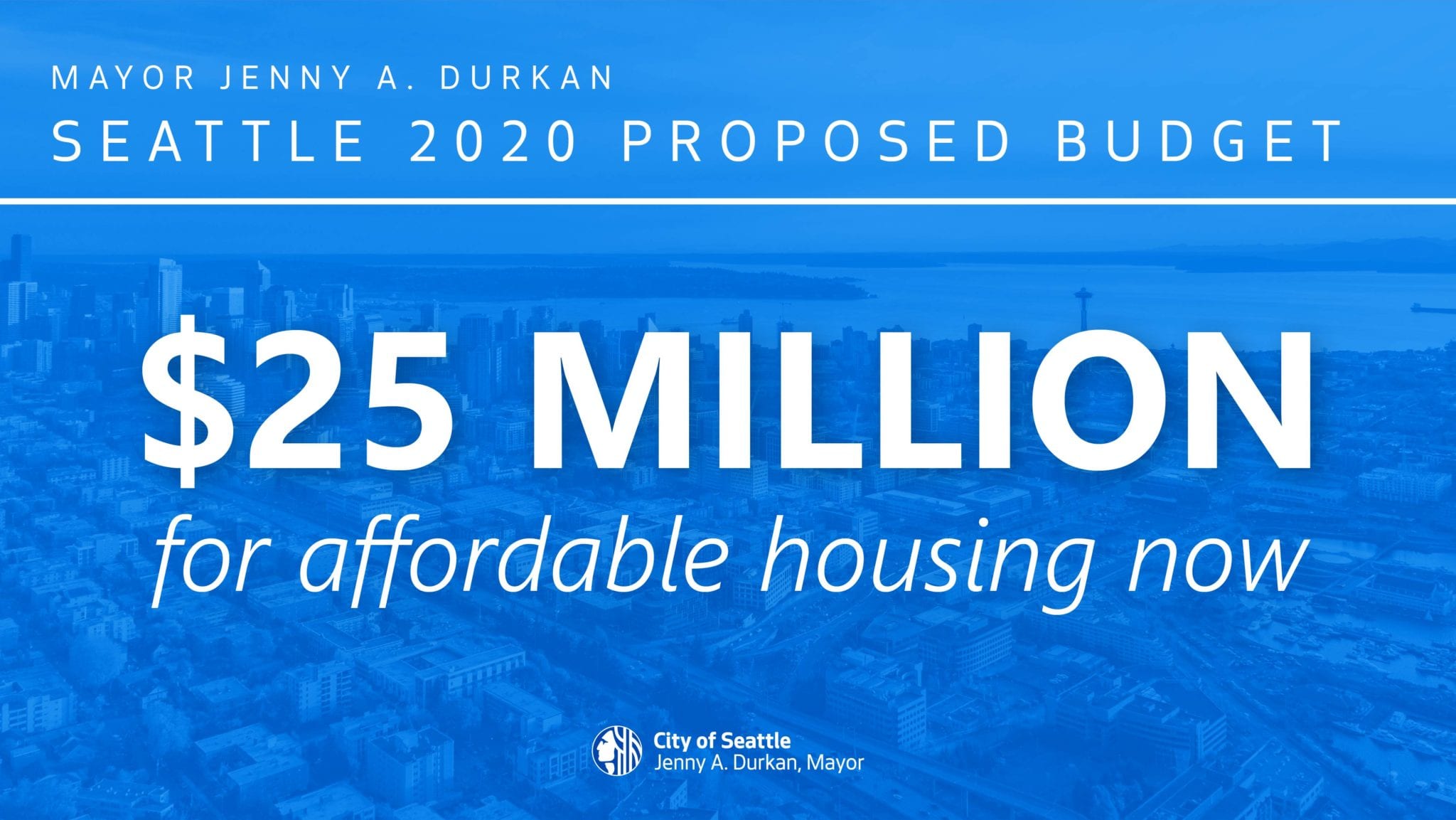
And second, as I shared last week, I am proposing my “Fare Share” plan to make a modest tax on Uber and Lyft drives so they can make minimum wage, and to make sure we can invest another $52 million in housing near transit over the next five years.
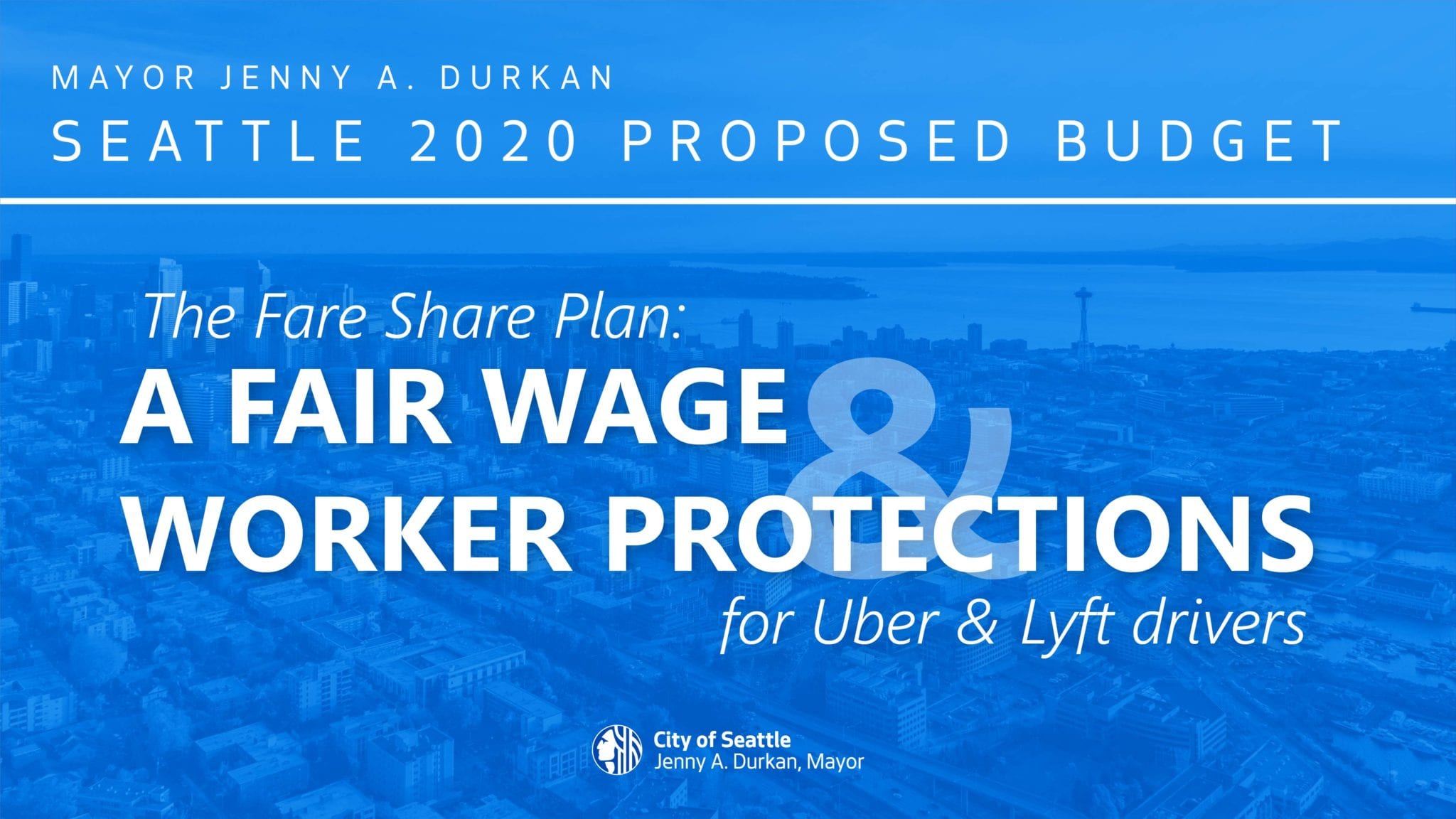
Look we grew so fast, we fell far behind on housing, social services, policy, and transportation.
We need to catch up.
As we build more housing, we must continue to build a more connected city.
We simply don’t have enough transit, and we don’t have enough safe, affordable, and reliable options for people to get around – no matter where you live.
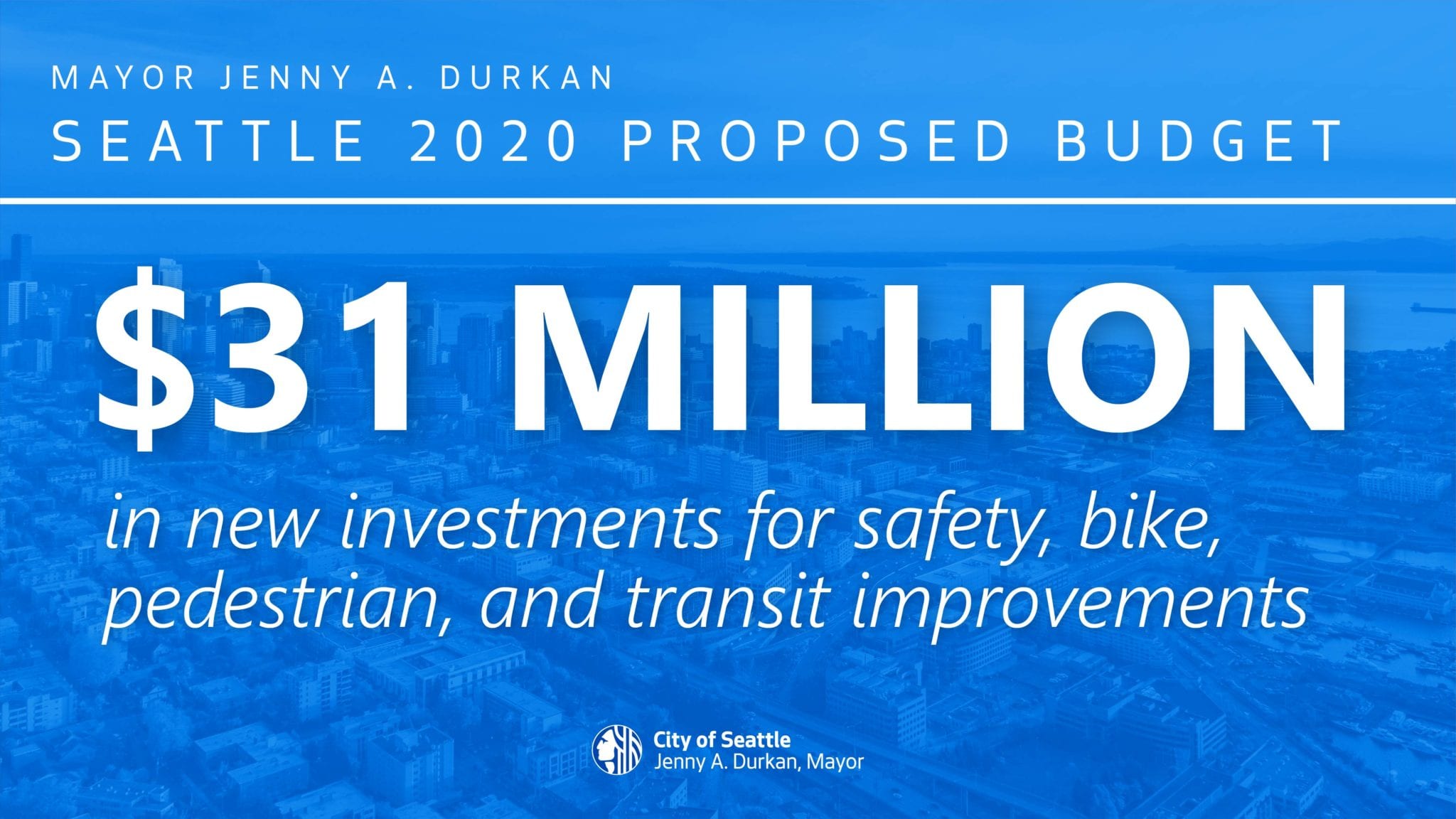
Taking transit, biking, walking, rolling, and carpooling must be a real alternative to driving alone in a car.
We can’t meet our climate goals unless we do that and do it with urgency.
Here in Seattle, we have a lot to be proud of.
During the viaduct closure, we showed we could change, and that people could get out of those cars.
We need to keep that going.
Recently, Seattle was called the best city in our country for public transit.
I would have just stopped with the best city in the country.
But over the last two years, we have increased our investments in King County Metro bus service by 71 percent.
We put a free ORCA card in the hands of every Seattle public high school student.
Alright students give me a shout-out if you’re using that ORCA card!
And as we increase access to transit, we are also building a safer, more connected bike network.
Over the next five years, we are ready to deliver an additional 50 miles of projects like bike lanes and greenways.
But it’s not enough.
That is why this budget invests additional revenues to fund projects not previously funded through the Bike Master Plan.
We also know that if we are going to stay a world-class city, we must have a world-class transit system.
So I’ve identified the funding we need to fully fund our downtown streetcar.
It is going to be very cool.
We will have a connected streetcar route from Capitol Hill, to Wing Luke, to the new waterfront, to South Lake Union and MOHAI.
Imagine, being down on the waterfront, and you can get to MOHAI and Wing Luke, or anywhere in between.
Seattle deserves world-class transit.
We will also continue to increase bus service through the Seattle Transportation Benefit District.
And we will keep expanding access to free ORCA – from high school students, Seattle Promise scholars to our Seattle Housing Authority residents.
We must make transit available for as many people as possible, at a zero or low cost.
We also must recommit to our goal of Vision Zero:
Our plan to end traffic deaths and serious injuries on our City streets by 2030.
We’re not doing enough, and the numbers are going in the wrong direction.
We must act with urgency so that roads – like Rainier Avenue – become safer for all users.
This budget funds that work.
Seattle leads the nation in transit use, and we still need more and better transit.
I can announce today that we will invest $31 million in new safety, bike, pedestrian, and transit improvements.
We’ll invest $16.7 million of the revenue from the sale of Mercer properties in Vision Zero transportation safety projects in every corner of our City.
From new protected bike lanes to better sidewalks – or any sidewalks in some neighborhoods…
…to a new transit-, pedestrian, and bike-only street that connects with light rail…
Everyone must have safe streets, and a place to walk, in every neighborhood in this city.
And thanks to some additional resources available through the Seattle Transportation Benefit District, next year we will buy 25,000 hours of bus service in addition, and we’ll invest another $4 million in first-and-last mile connections to transit so we can get as many people as possible to safe, reliable, efficient transit.
And yes, we’ll invest in bus stop shelters, benches, red bus-only lanes, and head start signals for buses.
Finally, I can tell you, it’s true, we have set a goal of 90 new blocks of red, bus-only lanes by the end of 2020.
And students, we need you in Olympia because we want to get a Block the Box bill finally passed!
In a city of the future, you must have safe and reliable transportation choices.
And this budget invests in that future.
None of this progress – and none of these investments we will deliver on in this budget – are possible without our incredible team at the City of Seattle.
Nearly every day, 12,000 public servants go to work ready to deliver for the people of Seattle.
So to my colleagues here at the City, I just want to say thank you.
I’m proud of what we do together, and I’m so excited about what’s ahead.
And I know how hard your jobs are and the pressures you face. So thank you, for everything you do for the City of Seattle.
And I just want to give a little pitch: Students, as you think about life after high school, I hope you’ll think about the chance to serve the public and work at the City of Seattle.
Members of the City Council, I look forward to working with you to cement this plan as a guide for our work in the coming year.
For some of you, voting on this budget plan will be among your final votes as a member of the City Council.
Council President Harrell, Councilmember Bagshaw, Councilmember O’Brien, who might have an excused absence, and Councilmember Pacheco – thank you for all you’ve done for the people of Seattle.
Can we give them a hand?
Seriously, they have done so much.
You students will learn later on, when you run for City Council and become Mayor, how much fun it will be.
For all of us here, I hope that our story can be that we worked together to invest in a safer, more just Seattle.
That we built more low- and-middle income housing.
That we ushered in that new era in the fight against homelessness in our region.
That we left a city more connected, with more safer choices for getting around.
That we built more pathways to opportunity for our young people.
That we invested in solving problems and building a future.
That these students, in a generation, really are running this city.
We have that chance.
And I think we should seize it.
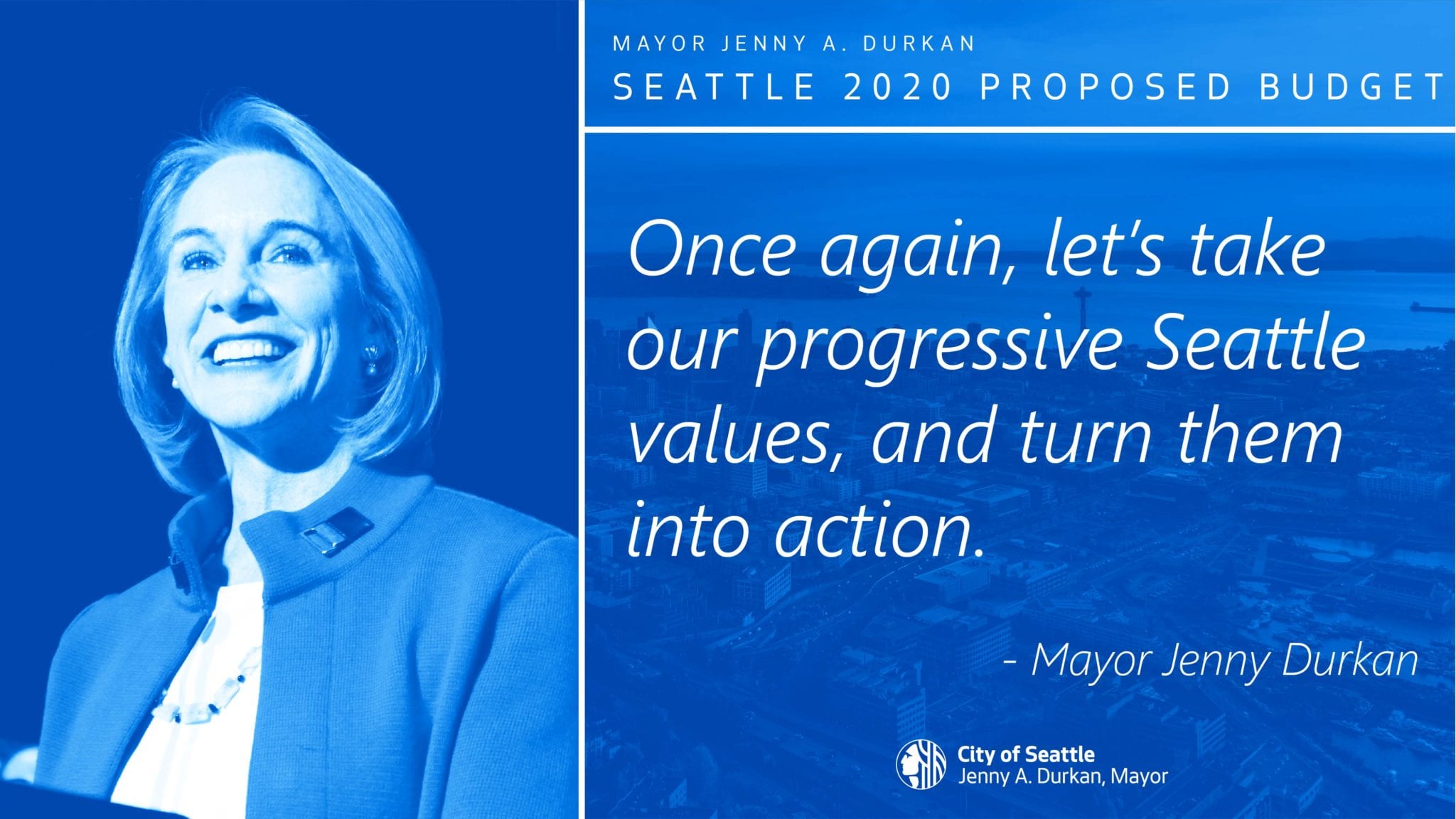
Once again, let’s take our progressive Seattle values, and turn them into action.
Action that does the most good for the most people.
Let’s make that our story.
Let’s carry on that work – and now, let’s go back to work.
Thank you all for being here – thank you Franklin High School and have a great year!
###